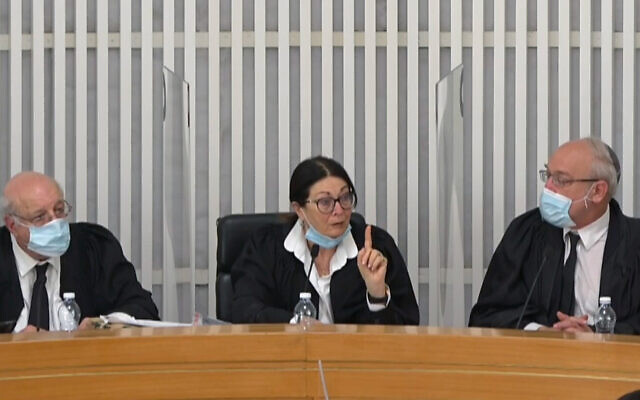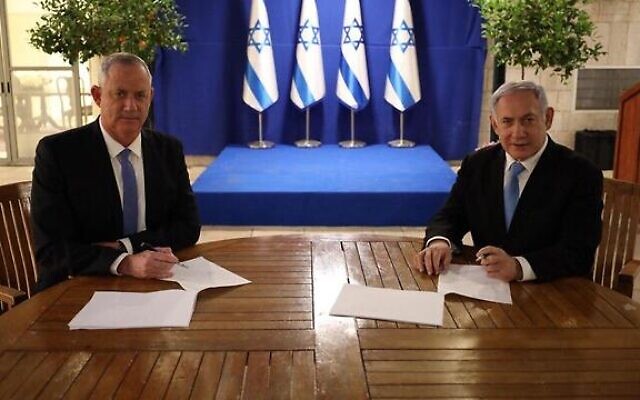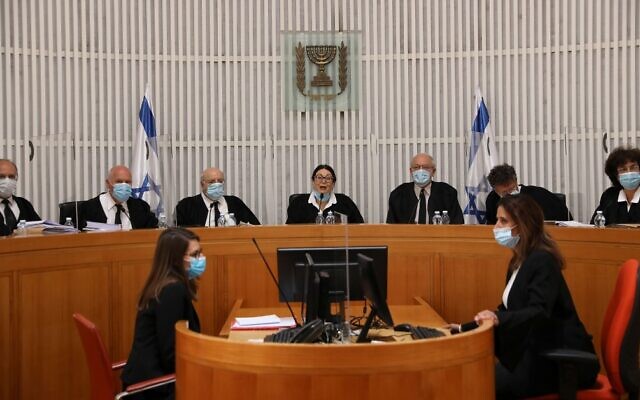Judges find no legal justification to prevent PM from leading new gov’t; say accord ‘raises serious difficulties’ but intervention inappropriate; coalition to be sworn in May 13

The High Court of Justice on Wednesday evening unanimously rejected a series of petitions seeking both to prevent Prime Minister Benjamin Netanyahu from forming a government due to the criminal charges against him and to block the coalition deal he signed with Blue and White party leader Benny Gantz.
The ruling paves the way for the two leaders to push ahead with their power-sharing coalition, in which Netanyahu will serve as prime minister for 18 months before handing over to Gantz (although the two are also said to be considering extending the government’s lifespan to four years). The Knesset is set to approve the coalition deal on Thursday, and the coalition is set to be sworn in next week, ending a 16-month period in which Israel has been without a fully functioning government.
In a decision handed out after 11 p.m. on Wednesday, the expanded panel of 11 judges ruled that there is no legal impediment to Netanyahu being tasked to form a government and retaining the premiership even with indictments being filed against him in three corruption cases, including bribery in one of them. His trial is set to start on May 24.
However, they also hinted that legislation making its way through the Knesset as part of the deal can still be challenged once passed, and said parts of the agreement raise “significant difficulties.”
In a two-day hearing this week, the court heard arguments from eight petitioners seeking to block Netanyahu setting up a new government and to strike down parts of the complex coalition deal. Among the petitioners was former Gantz ally Yair Lapid, head of the opposition Yesh Atid party.
At issue was whether a lawmaker under indictment could be tasked with forming a government, as well as objections to various amendments to laws being passed as part of the agreement, which will enshrine a rotating prime ministership and place significant clamps on Knesset activity and senior appointments.
Chief Justice Esther Hayut wrote that Netanyahu still enjoys the presumption of innocence until proven otherwise, and that the law doesn’t prevent a criminal defendant from forming a government.
“We did not find any legal reason to prevent MK Netanyahu from forming a government,” Hayut wrote. “The legal conclusion we reached does not diminish the gravity of the pending charges against MK Netanyahu for violations of moral integrity, or the difficulties derived from a prime minister serving when charged with criminal activity,” she stressed.
As regards the coalition deal, Hayut called it “highly unusual” and said some of its elements “raise serious difficulties.” Among these, she cited clauses providing for a modified “Norwegian Law,” under which some ministers could give up their Knesset seats, and others on their parties’ lists would take their places in parliament. Nonetheless, the court ruled that there was no reason to intervene “at this time,” a phrase that was seen as leaving the door open to future challenges to the legislation underpinning the agreement.
Hayut also noted that the court was not intervening in part because of responses received on Tuesday from Likud and Blue and White, which agreed to amend elements of the agreement that the court had criticized.
The chief justice also raised concerns over the deal’s changes to the committee that selects Israel’s judges, under which Gantz ally Zvi Hauser will join the panel in the slot previously reserved for a member of the opposition, changing the delicate balance in the nine-member panel. This change, too, Hayut wrote, raises “serious difficulties” since the presence of an opposition MK on the panel enables “full expression of the democratic idea.” Nonetheless, since the secret ballot formally selecting the panel members had not yet been held, the court would not intervene.
All of the other 10 judges on the panel signed onto Hayut’s ruling.

Shortly before the ruling, Netanyahu’s Likud Party and Gantz’s Blue and White announced that the new government would be sworn in on May 13. The Knesset is expected to vote Thursday to pass the proposed amendments agreed to as part of the coalition deal.
Under the three-year coalition deal signed April 20, Netanyahu would serve as prime minister for 18 months, with Gantz as his alternate, a new position in Israeli governance.
They will swap roles midway through the three-year deal, while cabinet positions will be split between Netanyahu’s Likud party and Gantz’s Blue and White alliance, as well as their respective allies.
Reacting to the verdict, The Movement for Quality Government in Israel, one of the petitioners, said it would respect the ruling, but called the Netanyahu-Gantz government “the exact definition of ‘kosher but odious.”
“Morally and ethically, one cannot make peace with a situation in which a prime minister is a criminal defendant,” the group said in a statement, announcing a demonstration for Saturday night.
Politicians from Netanyahu’s right-wing bloc welcome the ruling.
“The judge did well to not intervene,” said Culture Minister Miri Regev from Netanyahu’s Likud party. “The people are sovereign in Israel, and they have spoken.”
Yamina MK Ayelet Shaked, a former justice minister who has long sought to limit the power of the court, said that the arguments raised during the hearings were political, not legal, “and it’s good that the court refrained from interfering.”
“The prime minister being tasked with forming a government is the height of a political process that fulfills the people’s will,” she said.
A main issue the court had considered was whether Netanyahu is legally allowed to form a government while under criminal indictment. He has been charged with accepting improper gifts and illegally trading favors in exchange for positive media coverage. He denies wrongdoing and claims the charges constitute an attempted “political coup” by the opposition, media, police and the state prosecution.
While Israeli law bars ministers from serving while under indictment, there is no such law applying to prime ministers. Petitioners argued that this was a lacuna left by the framers of the law because they did not imagine a situation in which a prime minister under indictment would attempt to retain power and set up a new government.
The court had intimated on Sunday, however, that it would not intervene on this matter. At one point in the afternoon session, Hayut pressed the petitioners to provide a basis for their demand that a lawmaker who was recommended by the majority of his Knesset peers to form the government be prevented from doing so. “Show us something! A law! A verdict! From this country’s [history]! From [somewhere else] in the world! Something!,” Hayut said. “After all, [you’re asking us to set] a global precedent! You want us to rule without a basis simply according to your personal opinion?”
In its ruling, the court said Netanyahu would need to abide by a conflict of interest arrangement while prime minister whenever dealing with law enforcement affairs.

The deal could offer Israel a rare period of political stability as it seeks to repair the economic damage wrought by the novel coronavirus, which has infected more than 16,000 people in the country and caused some 240 deaths. Netanyahu and Gantz battled through three deadlocked elections — in April and September 2019, and March 2020 — before Gantz in late March said he was ready to partner Netanyahu in an emergency coalition that would battle the pandemic and safeguard Israeli democracy.
Likud and Blue and White on Tuesday informed the court they would adjust some of the provisions of the deal that caused judicial concern.
Under the coalition deal, the government was to be defined as an “emergency” body for its first six months, tasked exclusively with combating the coronavirus. Following questions about that clause’s legality, the parties said they would amend the deal to say coronavirus will be the priority through the first six months, but other issues can be also handled.
They also said they would pause certain public appointments for only 100 days, instead of the originally planned six months.
The deal specifies that Netanyahu may press ahead from July 1 with plans to annex parts of the West Bank, including all of Israel’s settlements, even without Gantz’s support.
As reported by The Times of Israel
